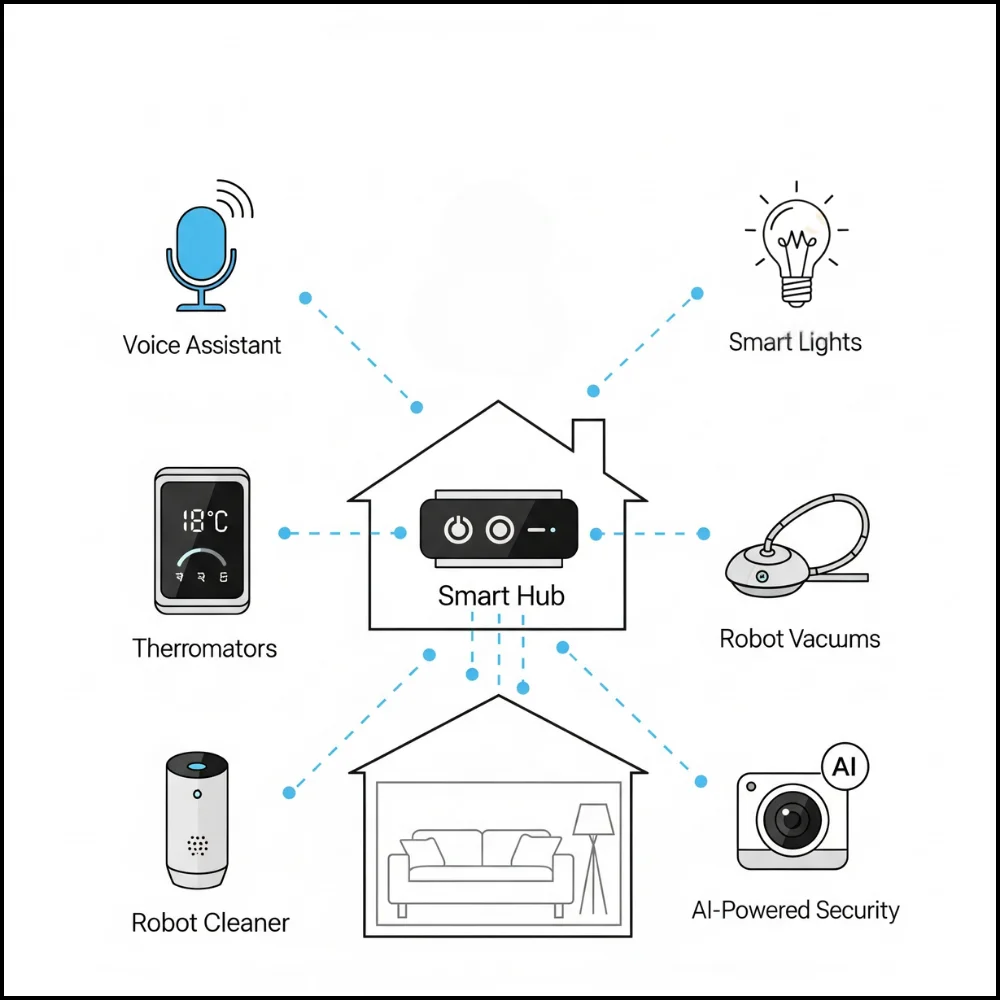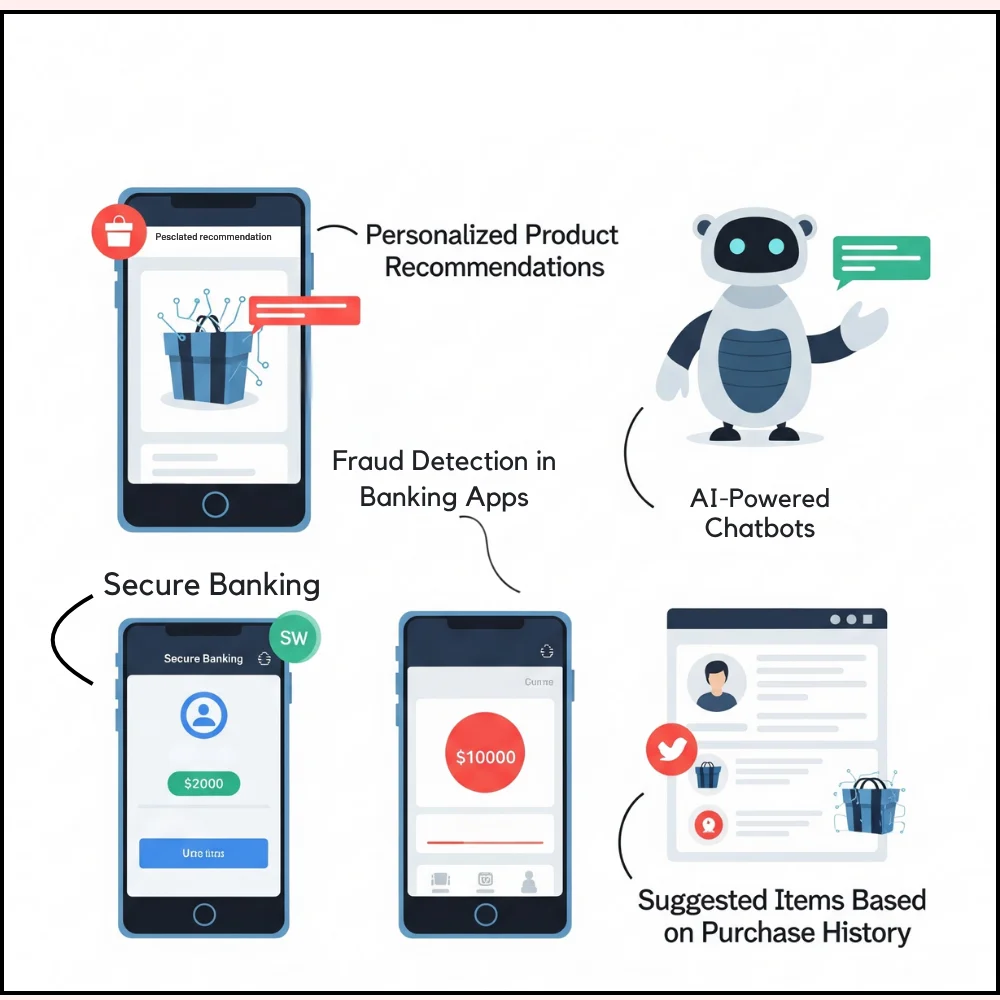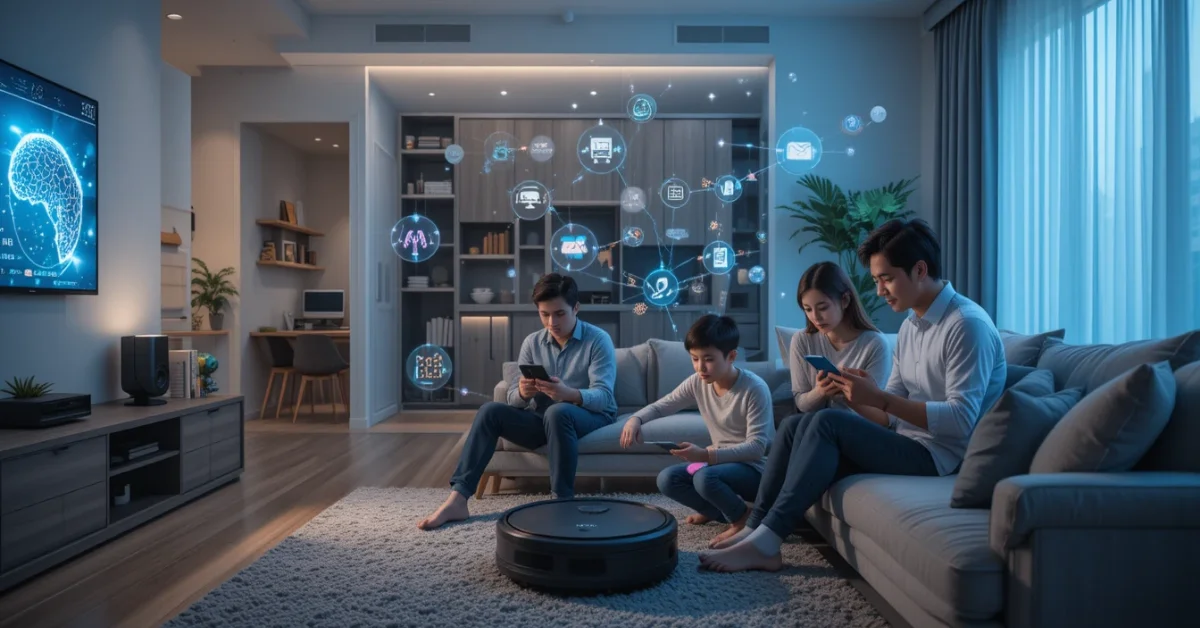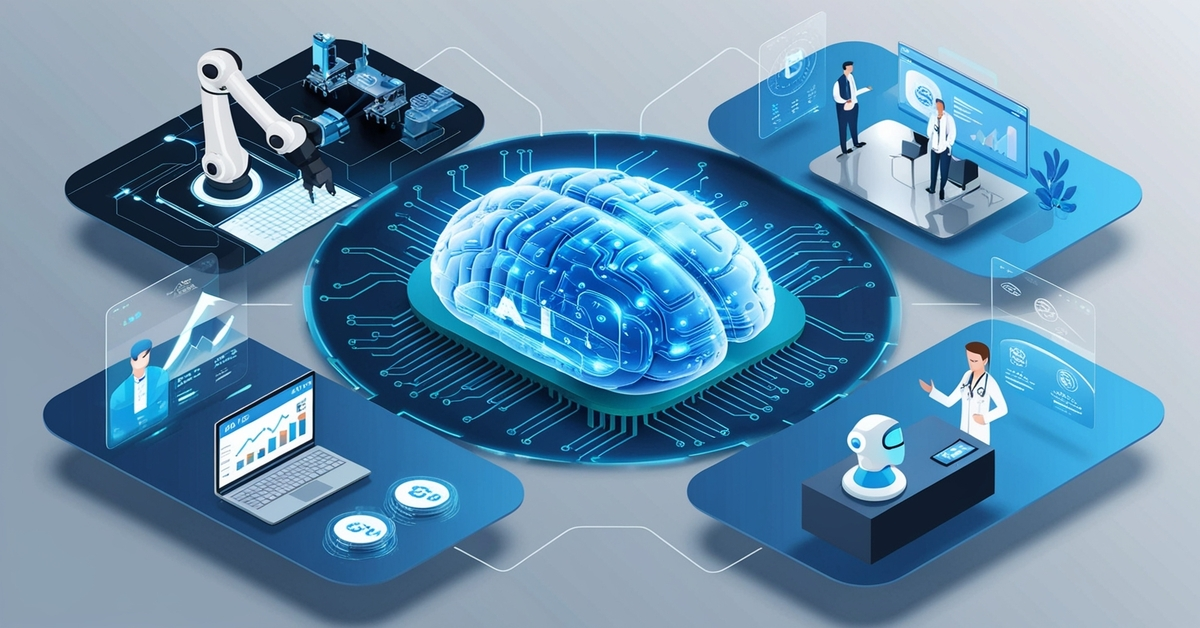Artificial Intelligence (AI) is no longer a future dream. It’s already here, quietly making our daily lives easier. From smart devices at home to helpful apps on our phones, AI is around us in many ways. You may not always notice it, but it works in the background, learning from your behavior and helping things run smoothly.
1. Smart Homes

In many modern homes, AI powers smart devices that respond to your actions or voice.
- Voice assistants like Alexa, Siri, or Google Assistant can answer questions, control lights, play music, or set alarms.
- Smart thermostats adjust room temperature based on your habits, saving energy and money.
- Robot vacuum cleaners map your house and clean your floors with minimal input.
- Smart locks, doorbells, and cameras add safety by recognizing faces or alerting you about visitors.
These tools offer comfort and convenience, even when you’re not at home.
2. Smartphones and Everyday Apps
Our phones are packed with AI-powered features we use every day.
- Auto-correct and predictive text help fix typos and suggest words while typing.
- Voice-to-text lets you speak instead of typing, turning speech into written words.
- Map apps use AI to find the fastest route, avoid traffic, and predict your arrival time.
- Social media apps learn what you like and suggest content based on your behavior.
- Translation apps quickly convert your speech or text into another language.
These smart tools save time and improve how we use our devices.
3. Online Shopping and Recommendations

AI plays a big role in how we shop online.
- E-commerce websites show products based on your past searches or purchases.
- Online stores suggest what you might need next, making shopping faster and more personal.
- AI-powered chatbots answer customer questions, help track orders, and solve basic problems.
- Banking apps use AI to detect fraud by spotting strange activity on your account.
AI makes online experiences smoother and often more secure.
4. Health and Wellness
AI is helping people stay healthier and get better care.
- Wearable devices like smartwatches track your heart rate, steps, and sleep. They alert you if anything seems wrong.
- AI helps doctors read X-rays, detect illnesses early, and make accurate diagnoses.
- Some apps use AI to help with mental health, offering breathing exercises, mood tracking, or guided therapy conversations.
- Health monitoring apps remind you to drink water, exercise, or take medicine.
These tools help you stay aware of your health and make better decisions.
5. Learning and Education
AI is changing how we learn, making it easier and more personal.
- Learning apps adjust lessons to your level and speed. If you struggle with a topic, the app slows down or gives you extra practice.
- Language-learning tools offer smarter quizzes, suggest daily goals, and track your progress.
- AI tutors help explain homework, show step-by-step math solutions, and answer science questions.
- Some schools use AI to help teachers grade papers or give feedback faster.
With AI, students can get more help and support, anytime and anywhere.
6. Work and Office Tools
AI boosts productivity and helps people work more efficiently.
- Email tools can sort your inbox, highlight important messages, and suggest replies.
- Writing assistants check grammar, tone, and spelling, helping you write more clearly.
- Virtual meeting tools transcribe speech to text, summarize conversations, and highlight action points.
- Smart software can automate tasks like sending reports, organizing files, or posting updates.
By taking care of routine tasks, AI lets people focus on more creative or complex work.
7. Travel and Navigation
AI makes getting from one place to another easier and safer.
- Ride-sharing apps match you with nearby drivers and suggest the fastest route.
- AI-powered maps warn about traffic, suggest detours, and update travel times.
- In cars, AI systems help with parking, lane changes, and collision avoidance.
- Airline autopilot systems use AI to help with flight paths, weather checks, and safety monitoring.
Whether you’re walking, driving, or flying, AI helps improve your travel experience.
8. Entertainment and Media
AI adds fun to your free time in smart and personal ways.
- Music apps suggest songs based on what you’ve played before or your mood.
- Streaming platforms recommend shows and movies you might enjoy next.
- Video games use AI to create smarter opponents and customize game levels.
- Photo and video editing tools can fix lighting, remove background noise, or add filters with just one click.
AI makes your downtime more enjoyable by tailoring content just for you.
9. Helping People with Disabilities
AI is also making life easier for people with support needs.
- Apps for the visually impaired can describe surroundings, read text aloud, or identify objects.
- Voice control helps those with physical disabilities operate lights, appliances, and devices.
These tools give more independence and better access to everyday life.
10. Safety and Environment
AI also plays a role in making the world safer and more eco-friendly.
- AI systems can detect unusual behavior in surveillance cameras and alert security teams.
- In farming, AI-powered sensors can water crops only when needed, saving water.
- Smart energy systems in buildings adjust heating and lighting to reduce waste.
- AI helps scientists track weather changes, monitor pollution, and protect endangered animals.
Technology isn’t just about convenience; it’s also helping to protect our planet.
Final Thoughts
AI is all around us, often in ways we don’t notice. It helps at home, at work, in school, and even during our leisure time. Whether it’s fixing a typo, keeping us safe, or suggesting what to watch next, AI is quietly making life better.
But as AI grows, we should also use it wisely. It’s important to protect our privacy, avoid over-dependence, and stay in control. When we use AI with care, it becomes a helpful friend in everyday life.



